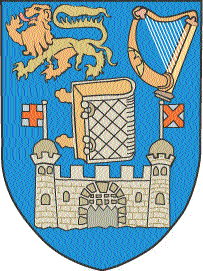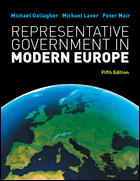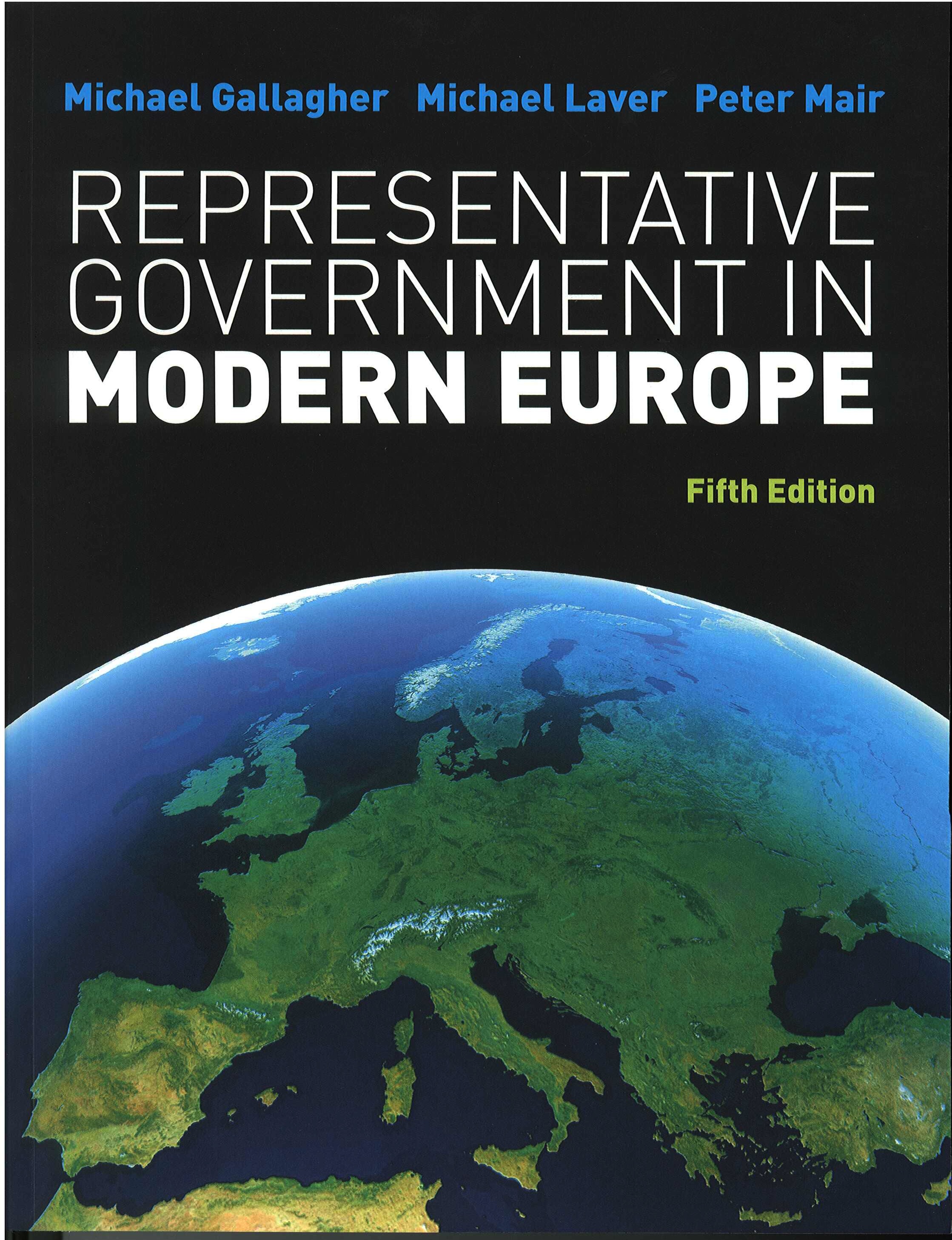
Department of Political Science, Trinity College Dublin
Michael Gallagher

 |
Department of Political Science, Trinity College Dublin Michael Gallagher |
 |
Representative Government in Modern Europe 5
web site
This page contains information about the book Representative Government in Modern Europe, 5th edition (507 pp). ISBN 978-0-07-712967-3 (paperback). For full details see the McGraw-Hill UK site.
*** Sadly, one of the authors of this book, Peter Mair, died on 15 August 2011 ***
See obituary in Irish Times and tributes on politicalreform.ie and in EUI Review.
The book was published in 2011 by McGraw-Hill. Previous editions of the book were published by McGraw-Hill USA, but the 5th edition is published by McGraw-Hill UK. This should not affect the availability of the book in any country, but in case of difficulty or uncertainty please consult McGraw-Hill UK. In the USA specifically, the book is available through Lightning Source, a print on demand service, which is part of Ingram (a huge wholesaler and book distributor), so should anyone request the book in a bookshop in the US it can be supplied. There is also the option, where a number of copies are required, of ordering it through McGraw-Hill's custom publishing tool Create (see www.mcgrawhillcreate.com). In the last analysis, the book can be ordered by potential US readers and adopters US direct from McGraw-Hill's European operations, should McGraw-Hill US not be able to assist.
This is the fifth edition of the book (RGME5); the previous edition was published in 2006. Across all editions, the book has sold in excess of 60,000 copies. The fifth edition has a rather attractive cover bearing what appears to be a satellite image of Europe from many millennia ago, with no sign of human impact: an almost entirely green land-mass with no cities, let alone borders, and certainly no sign of representative government rearing its head.

What it's about
The easiest way to get a quick idea of this is to look at the Table of Contents and the List of Tables and Figures - click here.
To quote from the preface:
"While expanding our country coverage we have been careful to retain the fundamental philosophy that has guided this book through its various editions and, to judge from the feedback we receive, is a major part of its appeal to readers. Our discussions are structured by what we see as the major substantive and intellectual themes in the study of representative government. We try as far as possible to discuss the full range of European countries, large and small, in the context of these themes, rather than organizing the book as a set of country studies. We have tried to keep the book as up to date as possible in its discussions of ongoing theoretical and empirical work on core features of representative government in modern Europe. Reviews of the book have stressed its value in introducing readers to current debates among those who analyse European politics, and this edition sets out to keep our discussion of these debates as up to the minute as possible. Naturally, we have also updated the data in most tables to make these as complete and current as possible."
As this says, the book is a book about European politics rather than a set of discrete chapters about individual European countries, and the material is organised by theme and by topic rather than by country. There is a chapter on governments, one on parliaments, one on political parties and so on, rather than a chapter on France, a chapter on Germany, and a chapter on Italy. This approach was relatively unusual when we wrote the first edition of the book but has become more common since then.
The themes explored in the book are essentially the same ones as those of the 4th edition. They are examined through chapters on governments, parliaments, constitutions and courts, the European Union, sub-national government, party systems, political parties, electoral systems, government formation, interest groups, civil service, and the impact of representative government. The detailed Table of Contents spells out the details.
'Europe' is a contested concept - when it comes to football, even Kazakhstan, whose centre of gravity has the same longitude as Afghanistan, is deemed to be a constituent part. Our interpretation is not quite so generous but the book does cover 30 countries: the then-current 27 member states of the EU (including the UK but not Croatia) plus Iceland, Norway and Switzerland. (Of course, some of the countries that we do not include, especially in the Balkans, are indisputably European - they are omitted simply because of data difficulties or because they are still too 'different' in many respects to compare with the rest of the continent.) At times this makes data collection quite a challenge and, from the feedback that we receive from users, the simple provision of reliable information on various aspects of politics in 30 countries is itself something that gives RGME an edge over its competitors.
The book examines each of its questions across all 30 countries, going in depth into specific individual countries as the need arises: the Netherlands might best exemplify the process of government formation, while Poland might be an ideal case to illuminate a discussion of the growing role of constitutional courts. The first edition of the book was confined to western Europe; the second and third editions contained a stand-alone chapter covering a number of post-communist countries; then, with the fourth edition, we took the plunge and integrated the post-communist countries (currently 10 of them) of them into the mainstream of the book. This is also how the fifth edition is organised, though this does not mean we are not aware of either bloc or country exceptionalism where it occurs; as we note on occasions throughout the book, in some respects, for example the relatively low level of party system institutionalisation, there are persisting differences between most post-communist countries and most of the longer-established democracies.
At the same time, we are conscious that readers want to feel they are engaging with politics and government in the real world and not simply at a high level of abstraction, and we have picked a subset of countries for which we discuss each broad theme in greater depth through a series of around 20 Boxes. In these, we present a short discussion of the subject - cabinet government, cleavage structures and the party system, the impact of electoral systems, and so on - for each of these eight countries: Denmark, France, Germany, Italy, Netherlands, Poland, Spain and the United Kingdom.
Who wrote it
The book, like all four previous editions, was written by Michael Gallagher, Michael Laver and Peter Mair - the first two based in Trinity College Dublin and New York University respectively, and the last-named, until his untimely death, at the European University Institute Florence.
As the preface says, writing the book entails, inter alia, following and often participating in the many debates among those who analyse European politics and introducing readers to these. Occasionally, as with some parts of the data collection, we may have felt 'We've done this so that you, the reader, don't have to', but on the whole it is a stimulating exercise to engage with the burgeoning literature to which so many political scientists, including some who do not work on Europe at all, have contributed.
As a teaching aid
We are impressed and gratified at the range and level of courses whose teachers use this as a course text. It is used in upper-level graduate courses and in first-year undergraduate courses, and at every level in between. The two course titles for which the book is the most obvious match are European Politics and Comparative Politics (or Comparative Government), but we're aware of a wide range of courses that employ RGME as the course text.
How to order
Details on the McGraw-Hill UK website. See above for ordering from the USA specifically.

If you have any questions, contact mgllgher (add @tcd.ie)
| Go to TCD home | Political Science home | MG home |
Last updated 10 May, 2019 12:27 PM